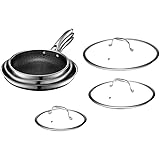Some suggestions to consider!
T-fal Stainless Steel Cookware Set, 11 Piece, Induction Cookware, Oven Safe to 500°F, Kitchen Cooking Set w/Fry Pans, Pots and Pans, Dutch Oven, Saucepans, Kitchen Essentials, Silver
$169.99 (as of February 21, 2026 09:30 GMT +00:00 - More infoProduct prices and availability are accurate as of the date/time indicated and are subject to change. Any price and availability information displayed on [relevant Amazon Site(s), as applicable] at the time of purchase will apply to the purchase of this product.)Cuisinart Chef’s Classic 11-Piece Stainless Steel Cookware Set, Pots and Pans Cooking Set with Aluminum Encapsulated Base to Heat Quickly and Evenly, Cool Grip Handles, Dishwasher Safe, 77-11G
$149.95 (as of February 21, 2026 09:30 GMT +00:00 - More infoProduct prices and availability are accurate as of the date/time indicated and are subject to change. Any price and availability information displayed on [relevant Amazon Site(s), as applicable] at the time of purchase will apply to the purchase of this product.)HexClad Hybrid Nonstick 6-Piece Fry Pan Set, 8, 10, and 12-Inch Frying Pans with Tempered Glass Lids, Stay-Cool Handles, Dishwasher-Friendly, Induction Ready, Compatible with All Cooktops
$399.99 (as of February 21, 2026 09:30 GMT +00:00 - More infoProduct prices and availability are accurate as of the date/time indicated and are subject to change. Any price and availability information displayed on [relevant Amazon Site(s), as applicable] at the time of purchase will apply to the purchase of this product.)
Choosing the Right Cookware Material
Understanding Different Types
First off, let’s chat about different cookware materials. From stainless steel to cast iron, each material has its own merits and quirks. Stainless steel is great for browning and deglazing, while cast iron retains heat like nobody’s business. Remember, the choice of material can really change your cooking game.
Don’t forget about non-stick options! They’re super handy for cooking eggs or pancakes without that dreaded sticking problem. However, they can be a little temperamental with high heat, so keep that in mind.
Lastly, there’s ceramic. It combines an eye-catching design with functionality, but you’ll want to treat it gently to avoid chipping. It’s all about finding the right fit for your cooking style—consider your needs and preferences carefully!
Evaluating Cookware Performance
Heat Distribution and Retention
When it comes to performance, heat is everything. Each cookware heats up differently; for instance, copper offers phenomenal heat conductivity, which is perfect for sauces, but it can get pricey!
Now, talking about retention, this is where cast iron takes the cake. It holds heat so well that once it’s hot, you can reduce the heat and let it work its magic. It’s a real treat for slow cooking!
What about being versatile? That’s where all-purpose cookware like stainless steel shines. It can move seamlessly from stovetop to oven, giving you a lot of bang for your buck.
Investing Smartly in Your Kitchen
Quality vs. Price
Let’s get real—kitchen gear can be a tad expensive. But investing in quality cookware is totally worth it, trust me! Low-quality options can warp quickly and often don’t distribute heat well, which can affect your cooking.
You might be tempted to go for the flashy brands, but remember that really good cookware doesn’t have to break the bank. Look for trusted brands with solid reviews that fit your budget without sacrificing quality.
A good strategy is to start with just a few key pieces rather than a whole set. This way, you can gradually add to your collection as you become more confident in your cooking skills!
Caring for Your Cookware
Maintenance Tips for Longevity
Now that you’ve got your top-rated cookware, it’s important to take care of it! Each type might require its own level of maintenance. For instance, cast iron needs seasoning to maintain its non-stick qualities, while stainless steel just needs a bit of soap and water.
It’s easy to forget this step, but always avoid using metal utensils on non-stick surfaces. Wooden or silicone options are your best friends in keeping those surfaces scratch-free.
Lastly, remember to store your cookware carefully. Stacking can sometimes warp pieces, so consider hanging them or using pot protectors. Treat them nicely, and they’ll treat you nicely back!
Utilizing Cookware for Better Cooking Techniques
Exploring Techniques with Different Cookware
Cooking is as much about technique as it is about your tools. With the right cookware, you can explore various methods like sautéing, braising, and baking to really enhance your meals.
For instance, a heavy-bottomed pot is my go-to when I want to knead dough for pizza or bread. It provides that perfect balance of weight and heat, which helps the dough rise beautifully!
Experimentation is key! Try using a piece of cookware in a way you haven’t thought of before. You might find you can make a fantastic risotto in your Dutch oven, or achieve perfect crispy veggies in a stainless steel skillet.
Frequently Asked Questions
1. What is the best material for cookware?
It really depends on your cooking style. Stainless steel is great for versatility, cast iron is awesome for heat retention, and non-stick is perfect for delicate foods.
2. How do I maintain my cookware?
Each type of cookware has its own care instructions. Generally, avoid abrasive cleaners, and remember to properly season cast iron. Always refer to the manufacturer’s guidelines for best practices!
3. Is it worth investing in high-end cookware?
Absolutely! While it may seem pricey at first, high-quality cookware can last for years and perform exceptionally well, which can elevate your cooking significantly.
4. How can I know if my cookware is safe?
Look for markings by the manufacturer, and consider reviews from trusted sources. Generally, brands with strong reputations for safety and quality are your safest bet.
5. Can I use metal utensils on non-stick pans?
Nope, it’s best to avoid metal utensils on non-stick surfaces as they can scratch and ruin the coating. Stick to wooden or silicone utensils to keep your pans in top shape!



